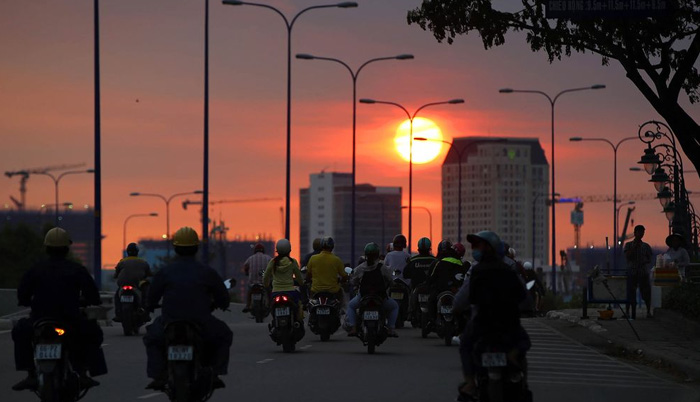![]() Home > World Business
Home > World Business
In Asia's Infrastructure Race, Vietnam Is Among The Leaders

Motorcyclists travel along a road during sunset in Ho Chi Minh City, Vietnam Photographer: Linh Luong Thai/Bloomberg
![]() March 23rd, 2017 | 09:26 AM |
March 23rd, 2017 | 09:26 AM | ![]() 944 views
944 views
VIETNAM
Vietnam is spending billions to attract foreign investors
It may be one of the smallest economies in Asia, but Vietnam is among those leading the infrastructure race.
Vietnam's public and private sector infrastructure investment averaged 5.7 percent of gross domestic product in recent years, the highest in Southeast Asia and compares with 6.8 percent in China, according to the Asian Development Bank. Indonesia and the Philippines spend less than 3 percent, while Malaysia and Thailand spend even less at under 2 percent.
The ADB estimates that emerging economies in the region will need to invest as much as $26 trillion through 2030 to build transport networks, boost power supply and upgrade water and sanitation facilities. Vietnam, among the fastest-growing nations in the world, is boosting infrastructure to lure more foreign investors as it positions itself as Asia's next Tiger Economy.
"The government knows that if they want to compete for investment, low wages aren't enough," said Eugenia Victorino, an economist at Australia & New Zealand Banking Group in Singapore. "They need infrastructure good enough to entice companies to put up factories. The development has been fairly spread out, with airports and roads being built across the country."
Those efforts are paying off. Foreign direct investment surged to a record $15.8 billion in 2016, and the economy is forecast by the World Bank to expand more than 6 percent until 2019, among the top performers this decade.
Its challenges are formidable. Vietnam needs about $480 billion through 2020 for infrastructure including 11 power plants with total capacity of 13,200 megawatts and about 1,380 kilometers of highways, according to the government. Just last week, Prime Minister Nguyen Xuan Phuc ordered the transport ministry to speed up plans to attract more private investment for infrastructure as the state budget can only meet a third of the financial need.
The share of private investment in infrastructure spending in Vietnam may be less than 10 percent, said Rana Hasan, ADB director of development economics. In India, the private sector plays a bigger role, accounting for more than 30 percent of total infrastructure investments in recent years, he said.
Others are planning to catch up. Philippine President Rodrigo Duterte has embarked on an ambitious goal of infrastructure spending at 7 percent of GDP, valued at $160 billion through 2022. While Indonesian President Joko Widodo struggled to get infrastructure off the ground in his early years in office, momentum is now building with the government speeding up projects including an uninterrupted toll-road connection in the country’s main islands and construction of a 720-kilometer railway from Jakarta to Surabaya.
Source:
courtesy of BLOOMBERG
by Karl Lester M Yap and Nguyen Dieu Tu Uyen
If you have any stories or news that you would like to share with the global online community, please feel free to share it with us by contacting us directly at [email protected]